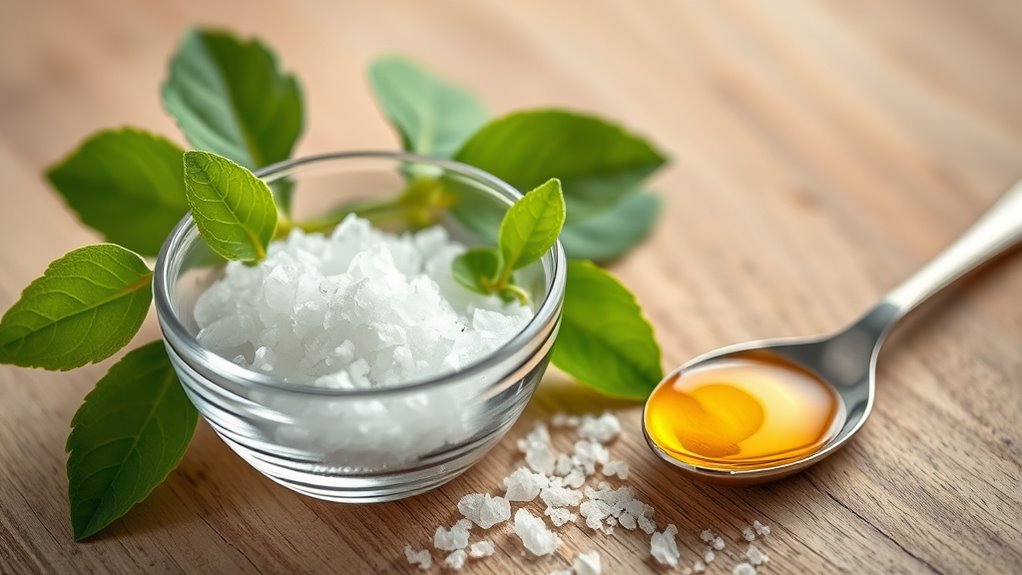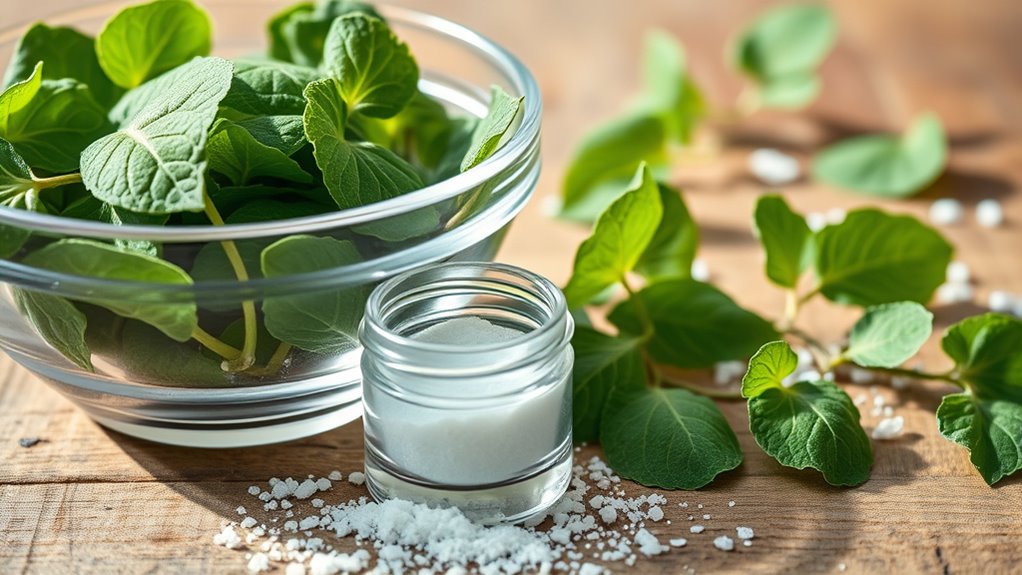When choosing keto sweeteners like stevia, erythritol, or other sugar substitutes, you get options that help you satisfy your sweet cravings without disrupting ketosis. Stevia is a natural, calorie-free sweetener from a plant, while erythritol is a sugar alcohol that tastes like sugar with minimal calories. Artificial options like sucralose are also available but may have drawbacks for some. Keep exploring to discover which sweetener suits your taste and health goals best.
Key Takeaways
- Natural sweeteners like stevia and monk fruit provide zero or minimal carbs, making them ideal for keto diets.
- Erythritol and other sugar alcohols mimic sugar’s texture and taste with nearly zero calories and no blood sugar impact.
- Artificial sweeteners such as sucralose and aspartame are highly sweet, heat-stable, but may cause gastrointestinal issues.
- Choice of sweetener depends on taste preference, health considerations, and recipe requirements, with natural options favored on keto.
- All sweeteners should be used within a balanced keto plan to maintain ketosis and avoid potential health concerns.

If you’re following a ketogenic diet, finding the right sweeteners can make all the difference in satisfying your cravings without kicking you out of ketosis. When choosing sweeteners, you’ll encounter two main categories: natural alternatives and artificial sweeteners. Natural alternatives, like stevia and monk fruit, come from plant sources and typically have zero or minimal impact on blood sugar levels. They’re popular among keto enthusiasts because they provide sweetness without the carbohydrate load of traditional sugar. Artificial sweeteners, such as sucralose and aspartame, are synthetically produced and are often much sweeter than sugar, meaning you need only a tiny amount to achieve the desired taste. However, some people prefer to limit artificial sweeteners due to concerns over potential health effects or aftertaste.
Stevia is one of the most well-known natural alternatives, derived from the leaves of the Stevia rebaudiana plant. It’s calorie-free and doesn’t raise blood sugar, making it a favorite for keto dieters. You can find it in powdered, liquid, or granular form, and it works well in beverages, baked goods, and even savory dishes. Erythritol, a sugar alcohol, is another popular choice. It’s naturally found in small quantities in fruits and fermented foods, but commercially it’s usually produced from corn or wheat. Erythritol has about 70% of the sweetness of sugar but contains almost zero calories and doesn’t spike blood glucose levels. Its texture and taste resemble sugar closely, making it an easy substitute in most recipes. Additionally, many keto-friendly sweeteners are easy to incorporate into various recipes, simplifying your transition to low-carb desserts.
Other natural sweeteners like monk fruit extract are gaining popularity because they offer intense sweetness without calories or carbs. Derived from the monk fruit, it’s often blended with erythritol to balance sweetness and reduce aftertaste. On the other hand, artificial sweeteners like sucralose are intensely sweet and heat-stable, so they can be used in cooking and baking. But some keto followers prefer to avoid these synthetic options, citing concerns about potential long-term health effects or gastrointestinal discomfort.
Ultimately, your choice depends on your taste preferences, health considerations, and how you plan to use the sweetener. Natural alternatives like stevia and erythritol are generally preferred for their minimal processing and natural origins, but artificial sweeteners are a convenient, low-calorie option if you’re sensitive to the taste or aftereffects of natural ones. Whichever you pick, just ensure it fits within your overall keto plan and helps you satisfy your sweet cravings without compromising your state of ketosis.
Frequently Asked Questions
Are Keto Sweeteners Safe for Children and Pregnant Women?
Keto sweeteners’ safety for children and pregnant women isn’t fully established, so you should exercise caution. While stevia and erythritol are generally considered safe for most adults, children and pregnant women have different sensitivities. It’s best to consult your healthcare provider before incorporating these sweeteners into your or your child’s diet, considering pregnancy considerations and overall safety to avoid potential risks.
How Do Keto Sweeteners Affect Gut Health Long-Term?
You might wonder how keto sweeteners impact your gut health long-term. Research suggests that some, like erythritol, may have minimal effects on your gut microbiome, while others, such as certain sugar alcohols, could cause digestive discomfort or alter your digestive health over time. It’s essential to monitor how your body reacts and choose sweeteners that support a healthy gut, maintaining balance within your digestive system.
Can Keto Sweeteners Trigger Insulin Responses?
Keto sweeteners can trigger insulin responses in some people, depending on their sensitivity and the type of sweetener used. While many like stevia and erythritol typically have little to no blood sugar impact, others might cause a slight insulin response. You should monitor your body’s reaction, as individual responses vary. Generally, choosing natural, low-glycemic sweeteners helps minimize blood sugar spikes and insulin fluctuations.
Do Keto Sweeteners Impact Ketosis or Fat Loss?
You might think keto sweeteners won’t affect your progress, but surprise—they can impact blood sugar and appetite regulation. While they’re low in carbs, some can cause subtle insulin responses, potentially hindering ketosis. Instead of boosting fat loss, they might tempt your appetite, making it harder to stick with your plan. So, enjoy them cautiously; even “safe” substitutes can play tricks on your body’s fat-burning efforts.
Are There Any Known Allergies or Sensitivities to Keto Sweeteners?
You should be aware that some people experience allergy symptoms or sensitivity concerns with keto sweeteners like stevia or erythritol. While rare, allergic reactions can include symptoms such as itching, swelling, or difficulty breathing. If you notice any adverse effects after consuming these sweeteners, it’s best to discontinue use and consult a healthcare professional to verify it’s safe for you. Always listen to your body and prioritize your health.
Conclusion
Now that you know about keto sweeteners like stevia and erythritol, you can confidently enjoy your favorite treats without breaking your diet. Did you know that erythritol has nearly zero calories and doesn’t spike blood sugar? This makes it a popular choice among keto enthusiasts. By choosing the right sugar substitute, you can satisfy your sweet tooth while staying in ketosis. Keep experimenting, and you’ll find the perfect balance to support your health goals.









